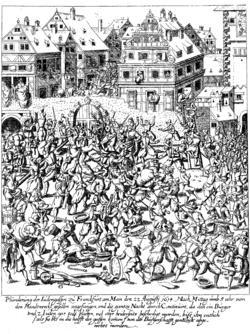
Back Pogrom Afrikaans Pogrom ALS Pogrom AN بوغروم Arabic Talan Azerbaijani Пагром Byelorussian Погром Bulgarian Pogrom Breton Pogrom Catalan Pogrom Czech
| Pogrom | |
|---|---|
 Plundering the Judengasse in a Jewish ghetto during the Fettmilch uprising. Frankfurt, 22 August 1614 | |
| Target | Predominantly Jews Additionally other ethnic groups |
| Part of a series on |
| Antisemitism |
|---|
 |
|
|
A pogrom[a] is a violent riot incited with the aim of massacring or expelling an ethnic or religious group, particularly Jews.[1] The term entered the English language from Russian to describe 19th- and 20th-century attacks on Jews in the Russian Empire (mostly within the Pale of Settlement). Retrospectively, similar attacks against Jews which occurred in other times and places also became known as pogroms.[2] Sometimes the word is used to describe publicly sanctioned purgative attacks against non-Jewish groups. The characteristics of a pogrom vary widely, depending on the specific incident, at times leading to, or culminating in, massacres.[3][4][5][6][7][8][9]
Significant pogroms in the Russian Empire included the Odessa pogroms, Warsaw pogrom (1881), Kishinev pogrom (1903), Kiev pogrom (1905), and Białystok pogrom (1906). After the collapse of the Russian Empire in 1917, several pogroms occurred amidst the power struggles in Eastern Europe, including the Lwów pogrom (1918) and Kiev pogroms (1919). The most significant pogrom which occurred in Nazi Germany was the 1938 Kristallnacht. At least 91 Jews were killed, a further thirty thousand arrested and subsequently incarcerated in concentration camps,[10] a thousand synagogues burned, and over seven thousand Jewish businesses destroyed or damaged.[11][12] Notorious pogroms of World War II included the 1941 Farhud in Iraq, the July 1941 Iași pogrom in Romania – in which over 13,200 Jews were killed – as well as the Jedwabne pogrom in German-occupied Poland. Post-World War II pogroms included the 1945 Tripoli pogrom, the 1946 Kielce pogrom, the 1947 Aleppo pogrom, and the 1955 Istanbul pogrom.
This type of violence has also occurred to other ethnic and religious minorities. Examples include the 1984 Sikh massacre in which 3,000 Sikhs were killed[13] and the 2002 Gujarat pogrom against Indian Muslims.[14]
In 2008, two attacks in the Occupied West Bank by Israeli Jewish settlers on Palestinian Arabs were labeled as pogroms by then-Prime Minister Ehud Olmert.[15] The Huwara pogrom was a common name[clarification needed] for the 2023 Israeli settler attack on the Palestinian town of Huwara in February 2023.[undue weight? – discuss] In 2023, a Wall Street Journal editorial referred to the 2023 Hamas attack on Israel as a pogrom.[16]
Cite error: There are <ref group=lower-alpha> tags or {{efn}} templates on this page, but the references will not show without a {{reflist|group=lower-alpha}} template or {{notelist}} template (see the help page).
- ^ Cite error: The named reference
Britannicawas invoked but never defined (see the help page). - ^ Cite error: The named reference
Brasswas invoked but never defined (see the help page). - ^ Cite error: The named reference
WileyBlackwellwas invoked but never defined (see the help page). - ^ Cite error: The named reference
Klier58was invoked but never defined (see the help page). - ^ Cite error: The named reference
internationalwas invoked but never defined (see the help page). - ^ Cite error: The named reference
Engelwas invoked but never defined (see the help page). - ^ Cite error: The named reference
books1was invoked but never defined (see the help page). - ^ Cite error: The named reference
books2was invoked but never defined (see the help page). - ^ Klier, John (2010). "Pogroms.". The YIVO Encyclopedia of Jews in Eastern Europe. YIVO Institute for Jewish Research.
The common usage of the term pogrom to describe any attack against Jews throughout history disguises the great variation in the scale, nature, motivation and intent of such violence at different times.
- ^ Cite error: The named reference
Atlanticwas invoked but never defined (see the help page). - ^ Cite error: The named reference
Berenbaum2005p49was invoked but never defined (see the help page). - ^ Cite error: The named reference
Gilbert30was invoked but never defined (see the help page). - ^ Bedi, Rahul (1 November 2009). "Indira Gandhi's death remembered". BBC. Archived from the original on 2 November 2009. Retrieved 2 November 2009.
The 25th anniversary of Indira Gandhi's assassination revives stark memories of some 3,000 Sikhs killed brutally in the orderly pogrom that followed her killing
- ^ "The Soul-Wounds of Massacre, or Why We Should Not Forget the 2002 Gujarat Pogrom". The Wire (India). 27 February 2022. Retrieved 26 May 2024.
This article is extracted and adapted from the author's book Between Memory and Forgetting: Massacre and the Modi Years in Gujarat, Yoda Press, 2019.
- ^ Koutsoukis, Jason (15 September 2008). "Settlers attack Palestinian village". The Sydney Morning Herald. Archived from the original on 5 April 2023. Retrieved 14 November 2023.
'As a Jew, I was ashamed at the scenes of Jews opening fire at innocent Arabs in Hebron. There is no other definition than the term "pogrom" to describe what I have seen.'
- ^ "Opinion | Hamas Puts Its Pogrom on Video". The Wall Street Journal. 27 October 2023.